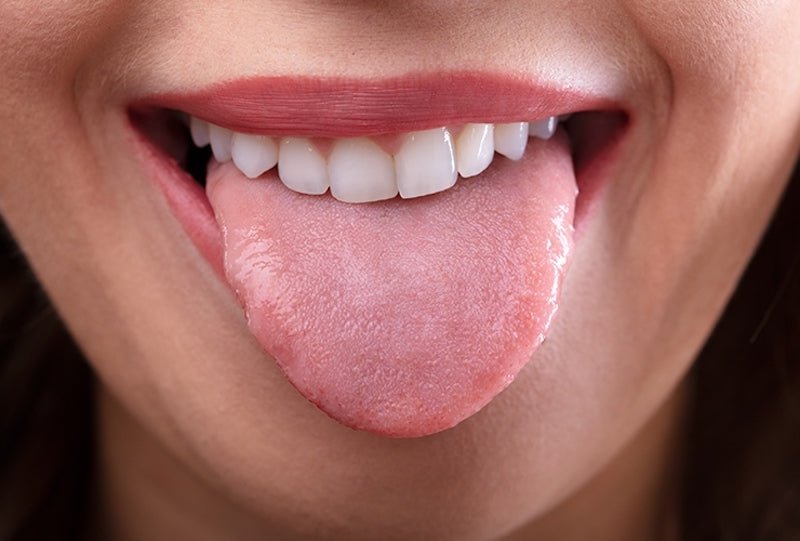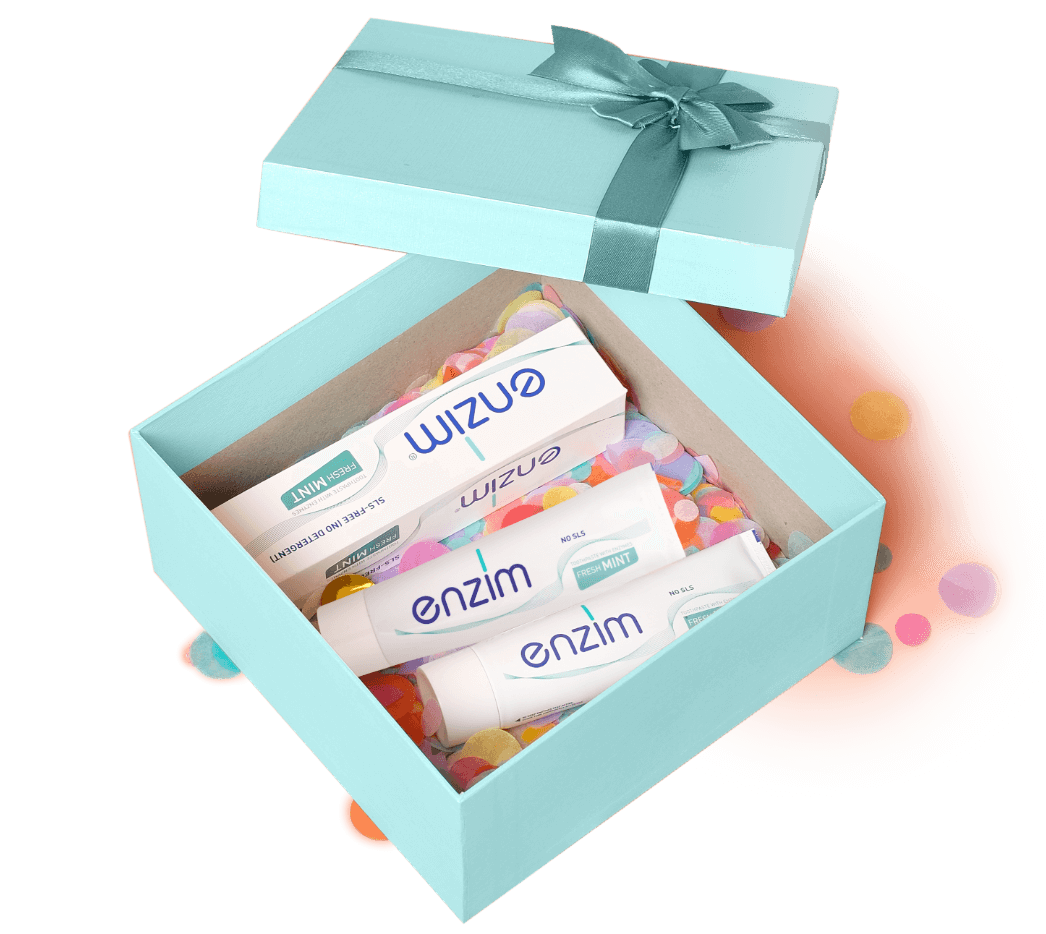Managing Dry Mouth After Brushing Your Teeth

Managing Dry Mouth After Brushing Your Teeth - Enzim Singapore
Dry mouth, also known as xerostomia, occurs when the salivary glands do not produce enough saliva to keep the mouth properly moisturized. Saliva plays an essential role in maintaining oral health by lubricating tissues, aiding digestion, neutralising acids, and protecting against bacteria and fungi. A lack of sufficient saliva can lead to a range of oral health issues, such as an increased risk of bad breath, oral thrush, tooth decay, cracked lips, and a dry or rough tongue.
Dry mouth can occur for a variety of reasons, but some people specifically experience it after brushing their teeth. This phenomenon may seem puzzling at first, as brushing is generally associated with improving oral hygiene. However, the causes of dry mouth after brushing are often linked to the ingredients in oral care products or underlying health conditions.
Common Causes of Dry Mouth After Brushing
1. Sodium Lauryl Sulfate (SLS) in Toothpaste
One of the most common reasons for dry mouth after brushing is the presence of Sodium Lauryl Sulfate (SLS), a detergent often used in toothpaste. SLS is responsible for creating the foamy texture many people associate with brushing, but it can also have unintended consequences. SLS can irritate the soft tissues inside the mouth, leading to a dry mouth by stripping away natural oils and reducing saliva quality. In some cases, SLS can even alter taste perception temporarily, making food and drinks taste slightly different after brushing.
SLS is also known to cause irritation for individuals with sensitive oral tissues, potentially leading to gum inflammation, cracked lips, and a feeling of tightness in the mouth.
2. Alcohol and Antiseptics in Mouthwash
Many commercial mouthwashes contain alcohol and strong antiseptics to eliminate bacteria and provide a fresh, clean sensation. However, alcohol-based mouthwashes can exacerbate dry mouth by reducing saliva production and dehydrating the oral tissues. Alcohol strips away moisture from the mouth, leaving it feeling dry and uncomfortable, especially after brushing when the oral tissues are already more exposed.
The antiseptic agents in mouthwash can further irritate the delicate mucous membranes in the mouth, increasing the feeling of dryness and discomfort.
3. Dehydration
Dehydration is another major factor that contributes to dry mouth, particularly after brushing. When the body lacks sufficient fluids, it prioritises hydration for vital organs, and the production of saliva decreases as a result. Many people may not realise that brushing can intensify this dryness, especially if they are already dehydrated. Insufficient saliva makes it harder to cleanse the mouth naturally, leading to a rough, dry sensation that persists after brushing.
4. Medication Use
Certain medications have side effects that can directly lead to dry mouth. This is particularly common with medications such as:
- Antidepressants
- Antihistamines
- High blood pressure medications (diuretics)
- Asthma inhalers
- Chemotherapy drugs
These medications can interfere with the normal functioning of the salivary glands, reducing saliva production. If you're taking one of these medications and experience dry mouth after brushing, it could be a side effect of your treatment.
5. Underlying Medical Conditions
Several medical conditions can cause chronic dry mouth, which may become more noticeable after brushing:
- Diabetes: High blood sugar levels can cause dehydration, leading to a decrease in saliva production.
- Sjögren’s Syndrome: This autoimmune disorder specifically targets the body’s moisture-producing glands, including the salivary glands.
- Thyroid Disorders: Hypothyroidism, a condition in which the thyroid gland does not produce enough hormones, can lead to dry skin, dry eyes, and dry mouth.
If you have an underlying medical condition, it’s important to address both the root cause and the symptoms to prevent further complications.
How to Overcome Dry Mouth After Brushing
Dealing with dry mouth after brushing may seem challenging, but there are several effective strategies you can use to alleviate the discomfort. The key is to adjust your oral care routine, choose the right products, and address any underlying health concerns.
1. Switch to SLS-Free Toothpaste
The first step in managing dry mouth after brushing is to carefully review the ingredients in your toothpaste. Choose an SLS-free toothpaste to avoid the drying and irritating effects of this detergent. Toothpaste formulations that do not contain SLS or harsh chemicals are gentler on the mouth and help maintain saliva quality.
One such product is Enzim 40 Plus Toothpaste, which is not only SLS-free but also contains a unique blend of enzymes and colostrum to support oral moisture and saliva production. The active enzymes in enzim toothpaste, including Amyloglucosidase, Glucose Oxidase, and Lactoperoxidase, help enhance the natural defence mechanisms of saliva. These enzymes work to reduce bacteria that cause gum inflammation, cavities, and bad breath, while also supporting tissue regeneration and healing in the oral cavity.
Colostrum, a key ingredient in Enzim 40 Plus, helps keep the mouth hydrated by encouraging the production of high-quality saliva, which in turn keeps bacteria under control and prevents dry mouth.
2. Stay Hydrated
Dehydration is often overlooked as a cause of dry mouth. Make sure you drink plenty of water throughout the day, especially before and after brushing. Staying hydrated helps ensure that your body produces enough saliva to keep the mouth moist and protected. If you’re already experiencing dry mouth after brushing, drinking water can help alleviate some of the discomfort by flushing out irritants and rehydrating the tissues.
3. Consult Your Doctor or Dentist
If you are taking medications or have an underlying medical condition that contributes to dry mouth, it’s important to speak with your healthcare provider about possible solutions. In some cases, adjusting your medication or exploring treatment options for conditions like diabetes or Sjögren’s syndrome may help alleviate dry mouth symptoms. Your dentist can also recommend specific oral care products or techniques to manage dry mouth effectively.
Benefits of Using Enzim 40 Plus Toothpaste for Dry Mouth
For individuals experiencing dry mouth after brushing, Enzim 40 Plus Toothpaste offers a range of benefits beyond hydration:
- Moisturizes the Mouth: With colostrum and natural enzymes, Enzim 40 Plus helps retain moisture and improve saliva quality, providing relief from dryness.
- Prevents Bad Breath: By promoting healthy saliva production and reducing bacterial growth, Enzim 40 Plus prevents bad breath, keeping your mouth fresh throughout the day.
- Supports Oral Health: The active enzymes in Enzim toothpaste protect against tooth decay, gum disease, and oral thrush. They also aid in the regeneration of oral tissues, promoting overall gum health.
- Sensitive Teeth Protection: The gentle, SLS-free formula of Enzim 40 Plus is ideal for individuals with sensitive teeth, providing effective care without causing irritation or dryness.
Conclusion: A Thoughtful Approach to Oral Care
Dry mouth after brushing can be more than just a minor inconvenience—it can lead to significant oral health challenges if left unchecked. By choosing the right toothpaste, like Enzim 40 Plus, staying hydrated, and avoiding products that contain alcohol or harsh detergents, you can effectively manage dry mouth and protect your oral health. If dry mouth persists, consider consulting with a healthcare provider or dentist to explore further treatment options and ensure that your oral care routine supports your overall well-being.
